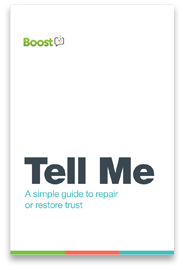The Erosion of Trust. The Cost and the Cure.

Daily media coverage would have us believe that trust is increasingly scarce. The erosion of trust in society is seen most clearly in our attitudes towards politicians, institutions and governments, and towards the corporate world. Charities are seeing a drop in the number of people donating over three consecutive years and are reporting a commensurate drop in trust levels.
Trust in the workplace is a near invisible but nonetheless vital ingredient: without it, every action and transaction are subject to additional friction. The direct costs of the erosion of trust is seen in delays, mismanagement and lower quality. Mistrust causes hesitancy, delegation is reduced, opinions and feedback are not shared openly, decision-making slows down, and time and opportunity are lost in second-guessing.
The indirect costs of the erosion of trust are equally great. In society at large when there is a breakdown in trust, we resort to regulation and new laws. In organisations, we create more and more systems and processes as a means of regulation. Not only do these put additional administrative burden on managers and supervisors, they often stifle initiative, creativity and innovation. More friction, more cost, less momentum.
Humans start from a position of Trust. While it can be lost, it can also be won or restored. If you’re interested in learning more about the key practices to build lasting, trust-based relationships, please reach out to us as it is covered in our programs. In the meantime, here is a wonderful short exercise to improve or restore trust, when it’s been damaged or broken. Anyone can use it, at work or at home, and if you approach it with an open mind, the relationship will be refreshed and energized.

Try a short exercise to restore trust with a colleague, a friend or a partner. Download your copy of "Tell Me"
DOWNLOAD NOW